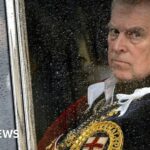BALTIMORE (RNS) — In their first conference election since the ascendance of an American pope, U.S. Catholic bishops have narrowly chosen Oklahoma City Archbishop Paul Coakley, the ecclesiastical advisor for a powerful group of conservative Catholics, as their new president. Their vice president will be Brownsville, Texas, Bishop Daniel Flores, a border bishop and key voice on immigration.
As the secretary of the USCCB since 2022 and the most senior member of leadership young enough to take the presidency, Coakley had been considered the favorite.
Coakley, appointed archbishop by Pope Benedict XVI in 2010, is well-known for his outspoken opposition to capital punishment, as well as abortion. His most recent pastoral letter opposed gender-affirming care and the “transgender movement.” He was formerly the chairman of Catholic Relief Services, the bishops’ international development organization. He was elected by the USCCB to represent them at Francis’ Synod on Synodality in addition to the U.S. bishops chosen by Francis.
While there had been some speculation ahead of the election that the bishops would choose a candidate that might move the conference closer to the Vatican and further from conservative U.S. politicians, the choice of frontrunner Coakley by a 128-109 margin over Flores maintains conference leadership aligned with the U.S. right.
Ahead of the election, some observers had framed the election as the body of U.S. bishops’ first major chance to demonstrate their commitment to the agenda of Pope Leo XIV. In his first six months as pope, Leo has largely continued his predecessor’s agenda for the church.
The new pope has made headlines in the U.S. for his criticism of the Trump administration’s approach to immigration, recently citing Matthew 25 to warn that people will be asked how they welcomed the foreigner at their final judgement. He’s also encouraged the U.S. bishops to speak out on immigration issues, at a time when some Catholics are also pushing the conference to take a more visible role.
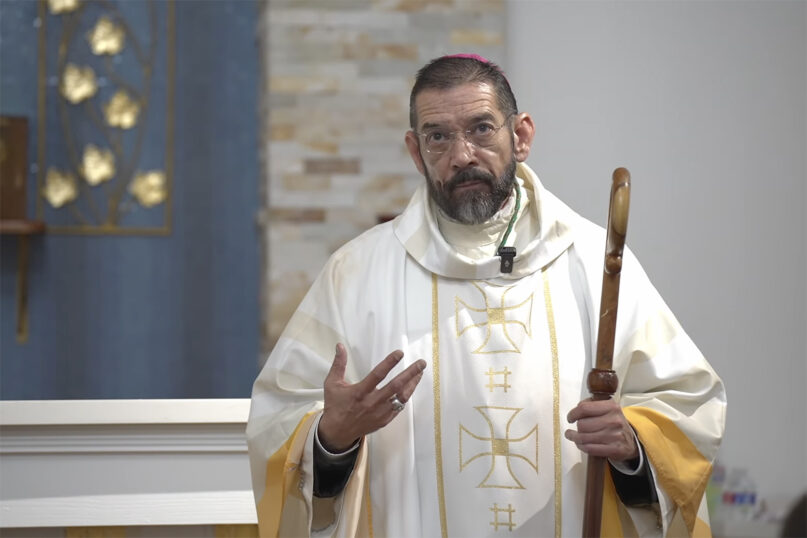
Bishop Daniel Flores, of Brownsville, Texas, speaks in 2025. (Video screen grab)
Pope Francis struggled to get the U.S. church, including the bishops’ conference, to enthusiastically embrace his priorities, including environmental action and synodality, a theological concept around dialogue.
While the conference made nods to those efforts, they often focused on other initiatives, like an evangelization campaign called the National Eucharistic Revival or articulating their anti-abortion position. And they have often elected leaders most engaged on those priorities, passing over the bishops receiving leadership roles at the Vatican.
During Francis’ papacy, U.S. opponents sometimes dismissively said Francis didn’t understand the U.S. church, said John Carr, founder of the Initiative on Catholic Social Thought and Public Life at Georgetown University. But now in the first year of the U.S. papacy, “The question is not whether the pope gets us, but whether we get the pope,” Carr said.
Critics of Coakley say he’s not aligned with Francis and therefore Leo. They’ve highlighted his public statement expressing his “deepest respect” for former U.S. Apostolic Nuncio Archbishop Carlo Maria Viganò and “his personal integrity” after Viganò released a document claiming Francis was part of a systematic coverup of former Cardinal Theodore McCarrick’s abuse of seminarians and calling on the pope to resign.
Francis’ defenders pointed to the fact that he only became pope after McCarrick had already retired, and, last year, Viganò was found guilty of schism and excommunicated for his refusal to recognize Francis and the legitimacy of the Second Vatican Council. Coakley’s statement remains available on the Archdiocese of Oklahoma City’s website, and he has not publicly retracted the sentiments.
Coakley also has ties to U.S. political conservatives, particularly as the ecclesiastical advisor for the Napa Institute, a well-heeled effort of influential Catholics that has historically promoted a combative Catholic conservatism. The standard registration fee for the Institute’s next summer five-day conference is $3,100.
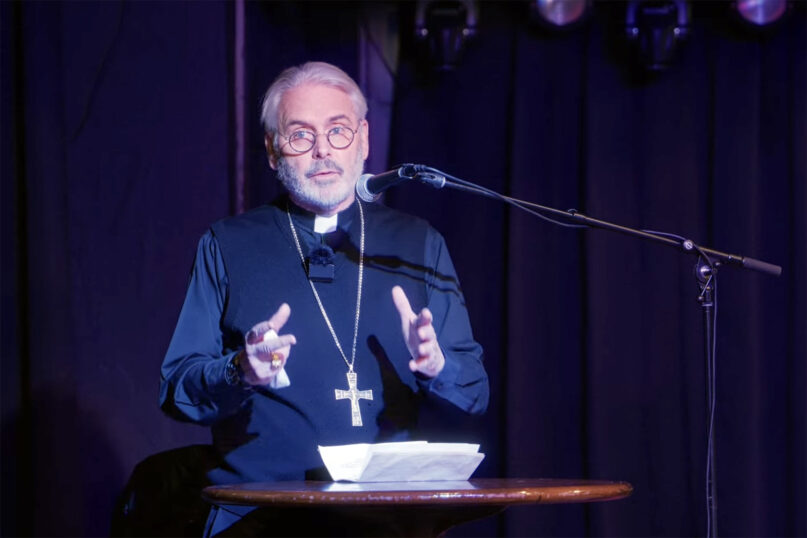
Oklahoma City Archbishop Paul Coakley speaks at an event in January 2025. (Video screen grab)
In March, the institute’s co-founder, Tim Busch, wrote, “Donald Trump’s administration is the most Christian I’ve ever seen” and praised many Catholics in the president’s orbit, noting he’d met and worked with many of Trump’s senior staff. Busch also wrote Vice President JD Vance, who had earlier accused Catholic bishops of being motivated by “their bottom line” in their approach to immigration, “may very well be the most articulate Catholic politician in the modern world.”
Busch serves on the board of the Napa Institute’s sister organization, the Napa Legal Institute, with Leonard Leo, a Catholic often credited with a key role in engineering the conservative supermajority on the Supreme Court.
In 2023, Coakley wrote a pastoral letter about “accompanying those experiencing gender dysphoria.” In the letter, sent as Oklahoma was considering a law restricting “gender-changing” medical procedures for minors, Coakley wrote that transgender people are “loved by God” and are people “Jesus Christ died to redeem.” But he called the “transgender movement” an “evil infecting our world,” saying it “must be rejected completely even as we love unconditionally those bound in its snares.” The governor signed the law the day after Coakley’s letter was released.
Coakley has taken a more hawkish public stance on immigration enforcement compared to many of his colleagues. El Paso, Texas, Bishop Mark Seitz, the outgoing migration chair for the conference, tends to emphasize that crossing the border without the proper paperwork is a misdemeanor.
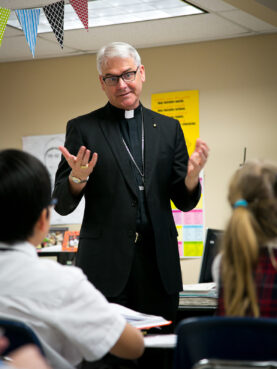
Oklahoma City Archbishop Paul Coakley visits a school in April 2015. (Photo courtesy of Wikimedia/Creative Commons)
But Coakley wrote in a February statement that, “Illegal immigration is wrong, and renewed efforts should be considered to protect our nation’s borders, most especially against the scourge of human and drug trafficking,” even as he quoted Pope Benedict XVI in calling Jesus a refugee and noted “the majority of undocumented immigrants in Oklahoma are upstanding members of our communities and churches, not violent criminals.”
Despite his conservative ties, like most Catholic bishops, Coakley is not uniformly aligned with Republican policies, especially when they differ from Catholic teaching.
He’s been a vocal critic of the death penalty, calling for its abolition. “The sanctity of life does not disappear after the commission of a crime — even a heinous one,” he wrote in 2023. He’s also cited the death penalty’s “widespread racial bias,” arbitrariness, wrongful conviction rates and “proclivity for targeting vulnerable populations such as people with intellectual disabilities and severe mental illness” in saying it should be abolished.
Catholic Relief Services, where Coakley served as chair, was one of the biggest beneficiaries of the U.S. Agency for International Development before the agency was gutted by the Trump administration’s Department of Government Efficiency (DOGE). His tenure on their board ended in 2019 before the politicization of foreign aid reached its recent fever pitch.
The bishops’ elections often come down to personal relationships and style. Ahead of the election, several commentators have noted that Coakley runs a meeting well.
Hoping for a presidency more aligned with Francis and Leo, there had been a quiet push for Brownsville, Texas, Bishop Daniel Flores, who ultimately earned the vice presidency on the first round after coming second for the presidency. The vice presidency sets up Flores to be a strong contender for the presidency in the next election in 2028.
Flores is episcopal advisor for the Catholic Mobilizing Network, an advocacy organization working to abolish the death penalty and promote restorative justice principles.
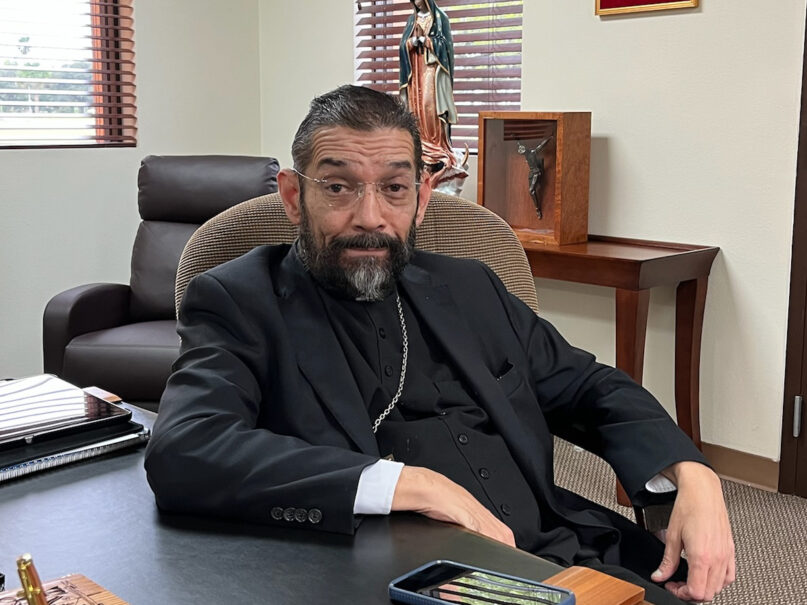
Bishop Daniel Flores in December 2024, in Brownsville, Texas. (RNS photo/Aleja Hertzler-McCain)
His leadership of the conference’s doctrine committee has emphasized theologically conservative approaches to gender and sexuality. Under his tenure, the committee began a process to block Catholic healthcare from providing gender-affirming care for transgender people.
But on immigration — emerging as a key topic for the bishops this year as nearly one in five U.S. Catholics are themselves, or have a household member who is, at risk of deportation —Flores has been outspoken in challenging conservatives and the government.
In July, when he was preaching bilingually about the Good Samaritan, Flores called on the Catholics in the pews to be neighbors to the immigrant members of his flock staying home from Mass due to their fear. “The least we can do is offer some compassion, acompañarlos en el sufrimiento” (accompany them in their suffering), he said. He called on them to provide food and “some consolation to people who think they are alone and have no one who cares.”
“The church has the liberty to serve,” Flores said in English, invoking a religious freedom argument for the church’s work with immigrants. “The government has no right to interfere with the church serving those in need.” His diocese’s Catholic Charities has been targeted by Texas Attorney General Ken Paxton for investigation as part of a broader effort by Paxton to close nonprofits that assist migrants.
Flores continued later in Spanish, “God does not blame anybody who, because of fear, does not come to Mass, but he does blame the people who cause that fear.” In President Donald Trump’s first days in office this year, his administration rescinded a policy restricting immigration enforcement at houses of worship.
Flores’ partnership with Sister Norma Pimentel, one of the world’s most famous religious sisters for her innovation in welcoming a surge of asylum seekers at the border, as she leads Catholic Charities of the Rio Grande Valley, is remarkable, given few high-profile bishops and sisters work so closely together, seemingly without stepping on one another’s toes. (Flores is technically Pimentel’s boss, but she spoke highly of his humility in a 2024 RNS interview.)
In Brownsville, Flores leads the only diocese in the country where every parish has a Spanish Mass, according to a 2024 USCCB survey. Only about 10% of U.S. Catholic bishops and priests are Hispanic or Latino, despite leading a U.S. church where one-third of adults and about 60% of Catholics under 18 are Hispanic.
The first two rounds of voting, where ten candidates were on the ballot before the vote went to a run-off in the third round, revealed relatively little support for third candidates.
Influencer Bishop Robert Barron of Winona-Rochester, Minnesota, who has over two and half million YouTube subscribers, got 26 votes on the first ballot. In the conference, he has been a key voice for advancing the National Eucharistic Revival strategy for evangelization, and other bishops have followed his lead on those issues. His media ministry Word on Fire was selected by the Conference to be one of two publishers for the first update to the Liturgy of the Hours in over 50 years.
Barron has recently waded into more controversial political topics, taking an increasingly combative stance toward the secular world. After the shooting of Charlie Kirk, Barron called the activist “a kind of apostle of civil discourse” and a “man who loved Jesus Christ,”
He’s also become closer with conservative politicians, attending the State of the Union with Representative Riley Moore (R-West Virginia) and joining the Trump administration’s Religious Liberty Commission.
Last week, he pushed back on the idea that he had criticized the Trump administration’s treatment of Catholics in immigration detention, saying his comments asking that detained Catholics have access to the sacraments were “pastoral, not political.”
But his relatively weak showing indicates that most bishops did not want to pursue that style of leadership for the conference.
This is a breaking news story and will be updated.


